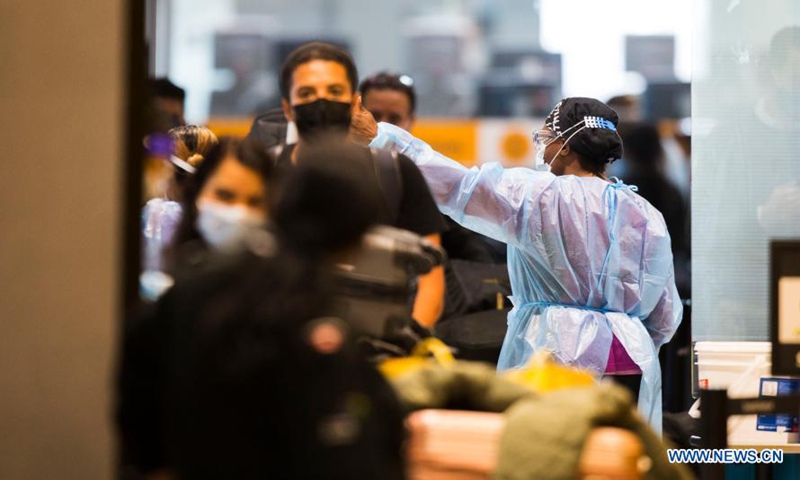WHO seeks to avoid stigmas
Virus variant names to switch to letters of Greek alphabet

A medical worker wearing protective gear on duty is seen at a COVID-19 testing site at Toronto International Airport in Mississauga, Ontario, Canada, on Feb. 1, 2021. Canada's Ontario required all international arriving passengers to take a COVID-19 test upon arrival starting on Monday to stop the spread of COVID-19 variants. (Photo by Zou Zheng/Xinhua)
COVID-19 variants are to be known by letters of the Greek alphabet to avoid stigmatizing nations where they were first detected, the World Health Organization (WHO) announced Monday.The new system applies to variants of concern - the most troubling of which four are in circulation - and the second-level variants of interest being tracked.
"They will not replace existing scientific names, but are aimed to help in public discussion," said Maria van Kerkhove, the WHO's COVID-19 technical lead.
Under the new system, the variants of concern take on the following names: The hitherto so-called variant B.1.1.7 first reported in the UK becomes Alpha; the B.1.351 first discovered in South Africa becomes Beta, while the P.1 found in Brazil becomes Gamma.
The so-called variant B.1.617 found in India is split into sub-lineages, of which the B.1.617.2 variant of concern becomes Delta. The B.1.617.1 variant of interest is called Kappa.
Besides these names, there are two other scientific names in use for each mutation, while different geographic names have been used to describe the same variant.
The lineage names such as B.1.1.7.2 will still continue to be used in scientific circles, for the mutation information that their name conveys.
"While they have their advantages, these scientific names can be difficult to say and recall, and are prone to misreporting," the WHO said in a statement.
"As a result, people often resort to calling variants by the places where they are detected, which is stigmatizing and discriminatory.
"To avoid this and to simplify public communications, WHO encourages national authorities, media outlets and others to adopt these new labels."
Earlier in May, US President Joe Biden signed a hate crimes law aimed at protecting Asian-Americans who have suffered a surge in attacks during the COVID-19 pandemic.
US anti-extremism groups say the number of attacks and hate crimes against Asian-Americans has exploded since the beginning of the crisis.
The WHO has been trying to come up with simplified new nomenclature for the variants for several months.
The Greek alphabet contains 24 letters but there is no plan yet as to where to go next if they are exhausted.
Epsilon, Zeta, Eta, Theta and Iota have already been ascribed to variants of interest.
AFP



